The COVID Crisis has Highlighted the Importance of "Ownership" During Times of Instability: Q&A with MASUDA Junko
June 2, 2022
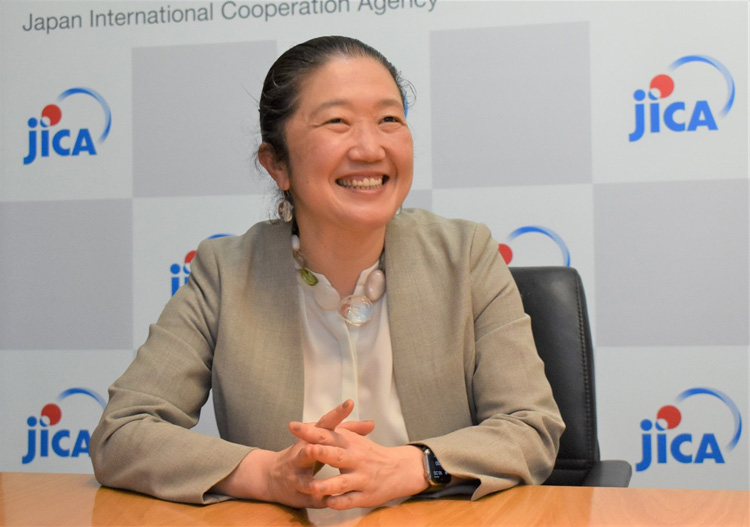
MASUDA Junko, Director General for the JICA Africa Department
The COVID pandemic has had far-reaching effects around the world, heavily impacting economic and social infrastructures in addition to the terrible loss of life. Developing nations, such as in Africa, have been particularly vulnerable to disruption, making ensuring their stability against future shocks a vital concern.
JICA (Japan International Cooperation Agency) has been working with Africa since the onset of the pandemic to alleviate its socio-economic impacts and to build a resilient continent against future shocks. Among the key features of JICA's cooperation is to put African ownership at the heart of development projects. "African ownership" is in fact one of the twin principles of TICAD (Tokyo International Conference on Africa Development), the latest of which, TICAD8, will be held this year.
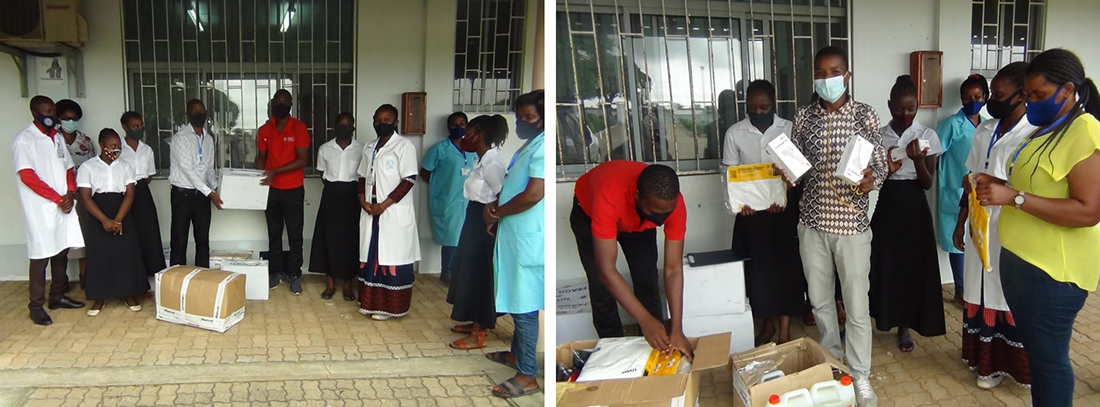
JICA has provided Resource Center of Inclusive Education Eduardo Mondlane with infection prevention products
To discuss this concept of ownership, we talked with MASUDA Junko, Director General for the JICA Africa Department.
Q: First, could you explain the basic principles of JICA?
JICA's philosophy is expressed by the words Human Security.
We want to empower the people so that they can cope with external shocks and build resilient societies.
While we might propose action plans, it is up to the people who live in the country to decide their future. To this end, we employ a people-focused approach. Building relationships of trust and respect is fundamental. While we can use our experience, we can't just export what worked in Japan to Africa. Know-how must be adapted to local contexts.
Q: Could you give us an example of JICA's focus on people?
Supporting education is critical, especially in Africa. Our School for All initiative encompasses about 70,000 schools in nine African countries, enabling communities to be involved in improving their children's educational environment. Communities elect their own representatives in a democratic and transparent manner, and work with the country's Ministry of Education.
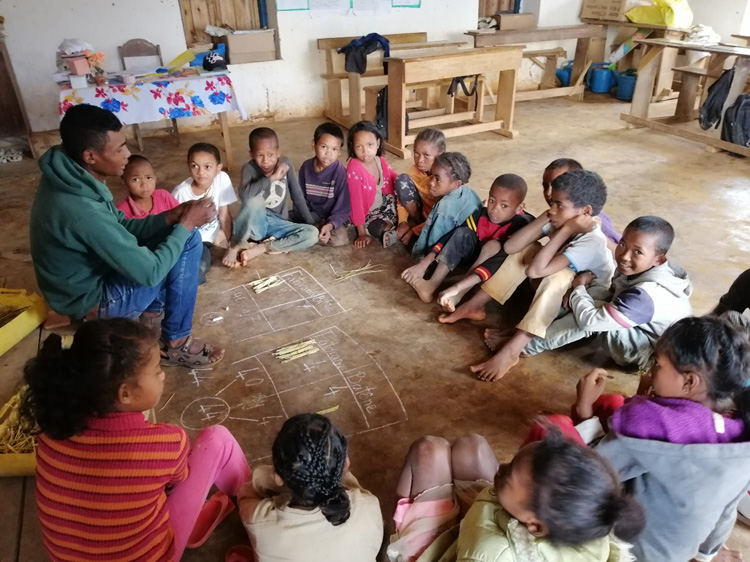
Children learning carry-over addition using sticks at a School for All remedial class (Madagascar)
JICA offers African youth various opportunities for higher education and training in Japan. The ABE Initiative (African Business Education Initiative for Youth), for instance, enables access to master's degree programs in Japan as well as internships at Japanese companies, while helping Japanese companies build valuable African connections for the future.
The people-focused approach also applies to industrial development.
JICA has been working to encourage African people to adopt the "Kaizen" method (*) for pursuing continuous improvement of quality and productivity. In 2017, JICA launched the Africa-wide "Africa Kaizen Initiative" in collaboration with AUDA-NEPAD, the development agency of the African Union. During 2019-2021, about 80,000 people in Africa had opportunities to learn this method.
(*) "Kaizen" is a Japanese word that means "improvement". The Kaizen method is a management philosophy and know-how that brings about continuous improvement of quality and productivity.
Q: The concept of ‘ownership' is very important to JICA. What does this mean to you?
Ownership is making one's own path and taking responsibility for that path. Having outside actors come in, do some development work, and then leave will not directly strengthen the capacity of the people who live there.
To generate change, people must consider how to implement that change according to their own local conditions. It's not an easy process and requires a great deal of time and understanding in order to develop ownership from an equal perspective. It's a continual trial-and-error learning process, and we always need to consider whether our cooperation has fallen into a top-down relationship.
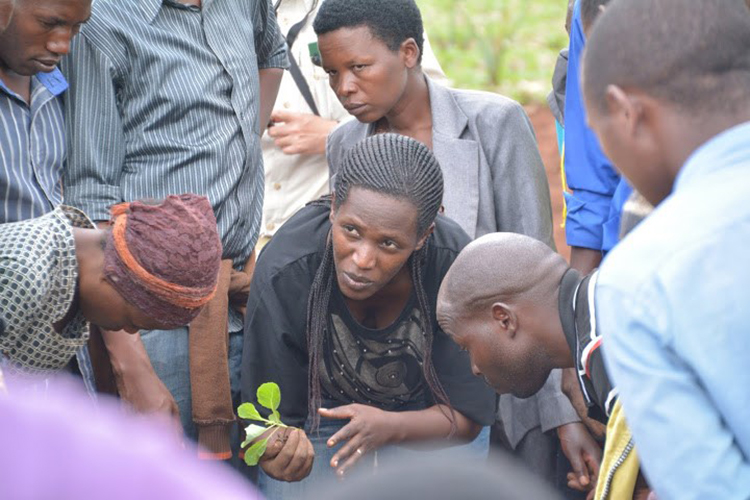
JICA has been cooperating in Rwanda to train farmers to "tackle challenges on their own"
in order to realize profitable agriculture.
For this reason, JICA encourages local counterparts to work on their own with a view to having them continue on their own after five years.
Q: How has the pandemic affected JICA's activities in Africa?
The pandemic showed that ownership is directly linked to the development of people's abilities. Because most of our experts had to return to Japan, we lost access to experts in healthcare cooperation, for which there is enormous need.
Yet in this situation, institutions like the Noguchi Memorial Institute for Medical Research in Ghana and the Kenya Medical Research Institute (KEMRI) fulfilled their functions in serving the needs of citizens. They took the lead in infection control, in their own countries and in neighboring countries. The absence of JICA specialists allowed our counterparts to take ownership and demonstrate how much they could do.

While in-person agriculture-related training is not available due to Corona, Online Training Course is being held online (left: using a blackboard for explanation from Japan, right: showing hoe from Zambia).
Technology also opened new possibilities. YouTube and Zoom enabled us to conduct rice cultivation training remotely. With WhatsApp, local experts could send updates on how the rice had grown. We could maintain communication and capacity building even when far away from each other.
Q: In your view, what are the keys to building resilience in African societies?
The pandemic and Ukraine crisis are tremendous external shocks that have highlighted Africa's vulnerability but also resilience. To face such challenges, ownership-the ability to solve problems and increase productivity by oneself—is vital. In particular, I want to continue focusing on cooperation that utilizes the power of young people.
By 2050, Africa will account for one-fourth of the world's population, and 60% of them will be young people. Meanwhile, in 20 years the global urban population will have doubled to about 1 billion people.
For young people to contribute to their societies, education and meaningful work are critical to social development and poverty reduction. For this reason, the School for All approach mentioned earlier has a role to play in providing appropriate support for the educational and social services through the power of communities that complement efforts by governments.
At the same time, we are supporting entrepreneurship and regional economic integration. Africa is now accelerating its efforts to establish a free trade zone on the continent, the AfCFTA, which is expected to transform Africa a single market. In order to make the AfCFTA operational, such cooperation is necessary to enhance connectivity and trade facilitation as well as to improve productivity in manufacturing and other industries.
Finally, we need take action against global warming, creating development plans and strengthening capacity in regions vulnerable to droughts and floods, and to support the shift to renewable energy at a pace suitable to each country. Food security and sustainable agricultural production are also key areas.
Q: Why is TICAD 8 important at this time?
The pandemic and the Ukraine crisis show the importance of resilience. By holding TICAD8 in this time of crisis, we reaffirm the importance of building democratic, trustworthy governments. This is where Japan's experience in human resource development, ownership, and democratic approach to development can be put to good use. It is the right time to take a new approach and flexibly incorporate innovative methods from non-government actors who have not been directly involved in development cooperation to promote digital transformation and resolve social issues.
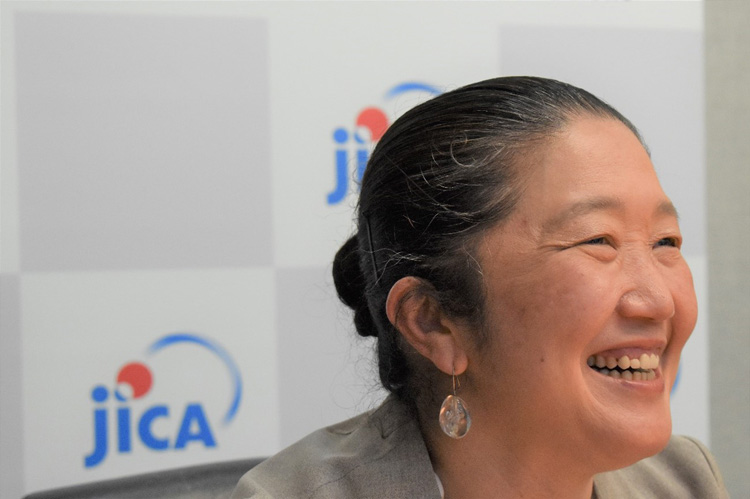
Related Links
- International Crises Highlight the Importance of International Cooperation in Africa: Looking ahead to TICAD 8 (May 11, 2022)
- TICAD 8 Looks at Opportunities to Deliver Results on an Individual Level for Post-Corona Africa (May 18, 2022)
- Three Decades of Promoting Ownership and Partnership: A Look at the History of TICAD (July 14, 2022)

